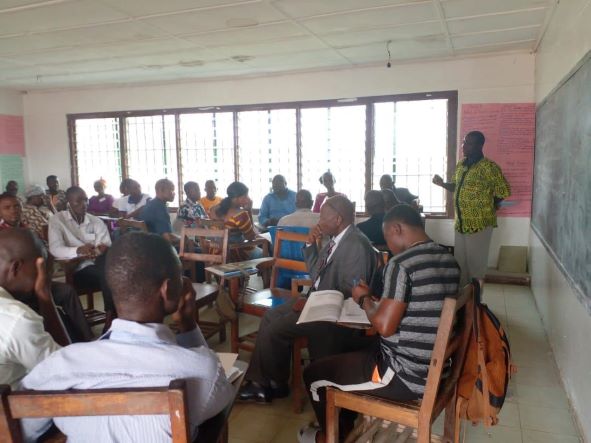PHOTO: Participants of MOE training at ZRTTI laud organizers for considering their welfare as key priority
By Alphanso G. Kalama, alphansokalama@gmail.com
Contact: 0776459784/0555716152
LOFA COUNTY, Liberia-The last time the Ministry of Education hosted a school leadership and management training for principals and others educators in this northwestern county, participants said it was a flop.
But now, the Education Ministry appears to have taken cue from the October 2021 glitches in this same county, as participants attending the second phase of the ministry of education school leadership and management residential training, disclosed that at least a great level of improvement has been made.
Phase one of the training was characterized by huge public outcry that made headlines in the media last year. Why Did Scores Of Teachers, Education Administrators Boycott Education Min. Workshop? – News Public Trust
They cited the areas of feeding, lodging, transportation reimbursement amongst others as compared with the first residential training in October 2021.
Expressing her view on the phase two of the training, Annie G. Paye asserted that since her arrival on the Zorzor Rural Teachers Training Institute (ZRTTI) campus here, she has been feeling comfortable on the campus, noting that some key challenges experienced in the past have been resolved by the Ministry of Education.

“For now the bathroom system has improved; but first, it was not so. As for the lesson or materials we are going through, it is really rich,” she said.
The female school administrator, who comes from the Sanoyea Public School in Bong County, also recommended to the education ministry to continue the training program due to the impact and positive change it will bring into the learning cycle.
At the same time, Ericson W. Togbah an educator of Sanniquellie Nimba County said, although they have not yet completed the training he grades the area of feeding, accommodation and lesson presentation as good.
“For the fact that we have not complete the training, I will grade the administrators of the workshop eighty-five percent,” Mr. Togbah noted.
Meanwhile, giving brief overview of the training was the project Coordinator, Joe K. Gbasakollie, who indicated that the Project Development Objectives are to improve equitable access to early childhood education, teacher quality in early childhood education (ECE) and primary education in Targeted Disadvantaged Counties, and strengthen National School Accountability Systems.
The project is funded by the Global Partnership for Education with the World Bank as Grant Agent.
According to him, the project has five components, which include a component on supporting teacher training and certification, and a sub-component on improving school management and accountability through school leadership and management training in targeted counties.
The Project Coordinator explained that over 300 principals are in training at ZRTTI as a part of the School Leadership and Management training under this second cohort.
The training programs were first initiated by external firms working with the government’s three rural teacher training institutes (RTTIs)- The Kakata Rural Teacher Training Institute (KRTTI), The Zorzor Rural Teacher Training Institute (ZRTTI), and The Webbo Rural Teacher Training Institute (WRTTI) using a capacity-building modality under the first cohort of 369 ECE and primary teachers and 395 principals he furthered.
Explaining more of the project to reporter Mr. Gbasakollie said the teacher training program aims to increase the number and proportion of certified primary and ECE teachers in targeted counties, while the principal training program aims to improve school-based management by providing requisite skills and knowledge to principals to make them great school leaders.
The exercise include residential and cluster training followed by several hours of self-study.
The trainees are provided rich content materials, pedagogical skills, school management and supervision skills.
The programs transitioned to the RTTIs in July 2021 and the second cohort of about 900 teachers and principals is being managed by the RTTIs.

